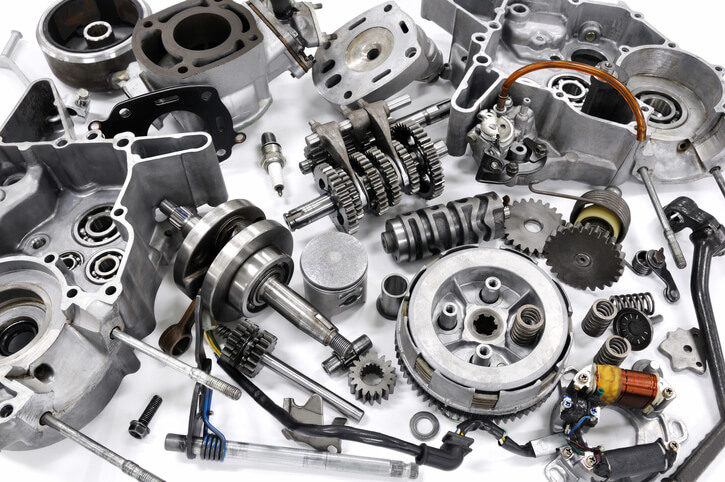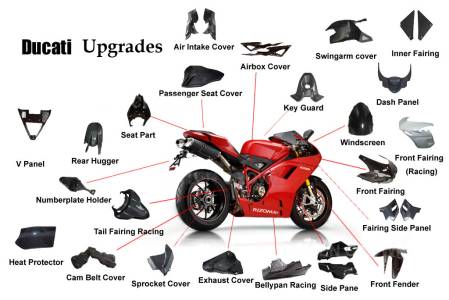Quick Fixes When Your Motorcycle Parts Auckland Start Showing Wear
Quick Fixes When Your Motorcycle Parts Auckland Start Showing Wear
Blog Article
Discover the Vital Motorcycle Components You Need for Ideal Performance
Comprehending the important parts of a motorcycle is essential for accomplishing peak performance. Each part, from the engine to the stopping system, plays a crucial role in general performance and safety and security. Regular maintenance can avoid unanticipated failures and enhance the riding experience. Lots of cyclists neglect the details of these systems. Uncovering how they work with each other can cause a much more reliable ride. What critical components should every motorcyclist focus on?
The Engine: The Heart of Your Motorbike
The engine acts as the core part of a bike, driving its performance and defining its capabilities. It is accountable for transforming gas into mechanical energy, which powers the bike forward. Numerous kinds of engines are used, consisting of single-cylinder, V-twin, and inline configurations, each offering unique characteristics suited for different riding designs and purposes. The engine dimension, typically determined in cubic centimeters (cc), substantially influences efficiency, with bigger engines generally offering more power and torque.Furthermore, the engine's style and technology, such as gas injection systems or air-cooling versus liquid-cooling, affect performance and integrity. Upkeep is vital for peak operation; elements like normal oil changes and monitoring ignition system assurance long life. Riders usually consider an engine's responsiveness and level of smoothness, as these characteristics enhance the overall riding experience. Inevitably, the engine remains a crucial component that defines not only the motorcycle's efficiency however also the biker's link to the maker.
The Transmission: Changing Gears Efficiently
The transmission plays an important role in a motorbike's performance, specifically in the technicians of equipment changing. Understanding exactly how to shift gears efficiently can boost the total riding experience, while regular upkeep assurances peak performance. Correct interest to these facets can substantially affect the longevity and effectiveness of the motorcycle.

Gear Shifting Mechanics
Smooth equipment changing is important for suitable motorbike efficiency, considerably influencing both acceleration and control. The auto mechanics of equipment changing include the interaction in between the clutch, gear bar, and transmission system. When a cyclist engages the clutch, it disengages the engine from the transmission, permitting a gear modification without harming the parts. A well-timed release of the clutch, integrated with precise movement of the equipment lever, helps with a smooth change in between gears. This process assures that the engine operates within its best power band, enhancing efficiency. Motorbike Components NZ. Additionally, understanding the gear ratios and their result on rate and torque can help bikers make educated selections throughout shifts, eventually adding to a much more pleasurable and responsive riding experience
Upkeep Tips Importance
Routine upkeep plays a necessary role in guaranteeing that the transmission system runs efficiently, allowing for smooth equipment shifts. Regularly inspecting and altering the transmission fluid is essential, as old liquid can bring about raised rubbing and wear. In addition, checking the clutch for wear warranties peak interaction and disengagement, protecting against slippage throughout gear modifications. Lubrication of relocating components is equally essential to decrease rubbing and enhance efficiency. Motorcycle proprietors ought to additionally keep track of for leakages and unusual sounds, as these can indicate underlying concerns. By adhering to these maintenance suggestions, bikers can prolong the life-span of their transmission system, assuring that gear changes continue to be smooth and contributing to the overall efficiency of their motorbike.
The Braking System: Ensuring Security on Every Ride
Braking systems are fundamental parts that directly affect a motorbike's security and efficiency. They contain various components, including brake pads, rotors, calipers, and hydraulic lines, all interacting to guarantee effective slowdown. The kind of stopping system-- generally either disc or drum-- affects responsiveness and quiting power.Regular upkeep is important to maintain peak performance; worn brake pads can lead to decreased efficiency and boosted stopping distances. Additionally, the top quality of brake liquid ought to be monitored, as it can absorb moisture in time, jeopardizing stopping efficiency.Riders should also take into consideration the value of anti-lock stopping systems (ABDOMINAL MUSCLE), which prevent wheel lockup during sudden quits, enhancing general safety. Appropriately functioning brakes are not practically stopping; they instill self-confidence in the cyclist, enabling for safer navigating via various terrains. Ultimately, a trusted stopping system is vital for taking pleasure in every trip with peace of mind.
The Suspension: Enhancing Comfort and Control
A well-functioning suspension system greatly adds to a motorcycle's general performance, complementing the effectiveness of the stopping system. The suspension plays a significant function in soaking up shocks from unequal surfaces, guaranteeing a smoother adventure while maintaining tire call with the roadway. This contact is important for both stability and control, allowing motorcyclists to browse corners with self-confidence and precision.Different types of shock absorber, such as telescopic forks or mono-shocks, provide varying levels of convenience and handling. Appropriately tuned suspension improves responsiveness, providing the cyclist with an extra connected feeling to the motorcycle. Regular upkeep checks are very important to identify the suspension components, consisting of dampers and springs, are functioning at their best. An efficient shock absorber not only raises the riding experience yet also adds to the longevity of other motorbike parts by minimizing deterioration. Consequently, buying high quality suspension is important for any major motorcycle lover.
The Tires: Connecting You to the Road
Tires play an important role in a motorbike's performance, acting as the primary web link between the biker and the roadway. Recognizing the different kinds of tires offered can significantly affect taking care of and safety. Furthermore, normal upkeep is crucial to ensure peak tire performance and durability.
Tire Enters Explained
Just how do various tire types influence a motorbike's performance? Tire types play a vital function in establishing a motorcycle's security, handling, and grasp. Sport tires, designed for high performance, offer enhanced traction and responsiveness on smooth roads, making them suitable for competing and aggressive riding. Alternatively, touring tires prioritize durability and comfort, offering a smoother trip for long-distance travel. Off-road tires, characterized by their tough step patterns, succeed in grip on unpaved surface areas, suitable for journey enthusiasts. Additionally, dual-sport tires mix qualities from both off-road and on-road categories, accommodating functional riding demands. Eventually, selecting the ideal tire kind is essential for enhancing efficiency, making certain security, and improving the total riding experience.
Maintenance Tips Offered
While riding when driving, preserving perfect tire condition is important for security and efficiency. Consistently examining tire pressure is crucial, as under-inflated tires can cause poor handling and raised wear. It is advisable to evaluate step deepness regularly; worn tires compromise grasp and security. Additionally, motorcyclists must seek indications of damage, such as cracks or bulges, which can show the need for replacement. Turning tires periodically assures even wear, enhancing durability. Furthermore, maintaining tires tidy from blog here debris and staying clear of too much visuals can lengthen their life-span. Ultimately, keeping proper positioning and balance adds to peak efficiency, lessening stress and anxiety on various other bike components. Following these upkeep suggestions will significantly improve the general riding experience.
The Gas System: Fueling Efficiency and Effectiveness
The fuel system plays a vital duty in optimizing a motorcycle's efficiency and effectiveness, as it ensures the ideal distribution of gas to the engine. It comprises numerous essential elements, including the gas tank, fuel pump, fuel filter, and gas injectors or carburetor. Each part must function properly to guarantee a smooth and powerful ride.The fuel storage tank shops gasoline and provides it to the engine via the gas pump, which generates the required pressure. A gas filter protects against impurities from entering the engine, while the injectors or carburetor mix fuel with air for combustion.Proper maintenance of the fuel system is vital; a blocked filter or malfunctioning injector can lead to decreased efficiency and raised fuel consumption. By verifying that the fuel system operates effectively, riders can take pleasure in improved throttle response, much better fuel economy, and generally boosted riding experience.
The Electrical System: Powering Your Adventure
An effective electrical system is essential for the total performance and safety of a motorcycle, as it powers vital elements such as the ignition, illumination, and various electronic systems. This system includes the battery, which stores energy, and the generator, responsible for creating power while the engine runs. The electrical wiring harness links these elements, guaranteeing reputable power distribution.Additionally, merges safeguard the system from overloads, while relays more help manage high-current tools with low-power signals. A properly maintained electrical system improves performance by ensuring smooth begins and consistent procedure of lights and signals, crucial for biker visibility and safety.Regular checks of the battery's charge and links are essential for preventing electric failures. Cyclists must additionally check wiring for damage, guaranteeing all components operate preferably. Ultimately, a robust electric system adds significantly to the overall performance and reliability of the motorbike.
Regularly Asked Concerns
How Commonly Should I Replace My Motorcycle's Battery?
The frequency of motorbike battery replacement relies on use and upkeep (Bike Parts Wellington). Typically, batteries should be replaced every 3 to five years. Regular checks can help identify when a replacement is necessary for peak performance
What Tools Do I Need for Fundamental Motorbike Upkeep?
For standard motorcycle upkeep, one calls for crucial devices such as a socket set, wrenches, screwdrivers, pliers, tire pressure gauge, and a torque wrench. These devices promote reliable maintenance and ensure the motorcycle runs effectively and safely.
Just How Can I Improve My Bike's Aerodynamics?
To enhance motorcycle the rules of aerodynamics, one ought to consider adjusting fairings, utilizing windshield extensions, maximizing body position, and reducing general weight. These modifications help lessen drag, improving stability and fuel efficiency during rides.
What Are the Signs of a Failing Electric System?
Indications of a stopping working electrical system consist of lowering lights, difficulty beginning, irregular tool readings, and blown fuses. Motorbike Components NZ. Unusual scents or rust around battery terminals may likewise suggest underlying problems needing instant focus for safety and performance

Exactly how Do I Pick the Right Oil for My Bike?
When picking oil for a motorcycle, one should take into consideration the supplier's specs, thickness ratings, and the kind of riding. In addition, synthetic versus standard oil can influence efficiency and engine security, influencing the choice considerably. The engine size, typically determined in cubic centimeters (cc), significantly affects performance, with redirected here larger engines generally giving even more power and torque.Furthermore, the engine's style and modern technology, such as gas shot systems or air-cooling versus liquid-cooling, impact performance and integrity. A well-functioning suspension system substantially adds to a motorbike's total performance, complementing the effectiveness of the braking system. The gas system plays an important role in taking full advantage of a motorbike's efficiency and efficiency, as it ensures the ideal delivery of fuel to the engine. A fuel filter prevents pollutants from entering the engine, while the injectors or carburetor mix fuel with air for combustion.Proper maintenance of the gas system is important; a clogged filter or malfunctioning injector can lead to lowered efficiency and raised fuel intake. A well-kept electric system enhances performance by making certain smooth starts and regular procedure of lights and signals, crucial for rider presence and safety.Regular checks of the battery's cost and links are essential for protecting against electrical failures.
Report this page